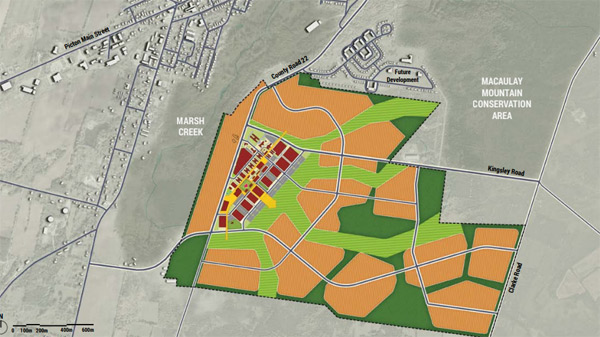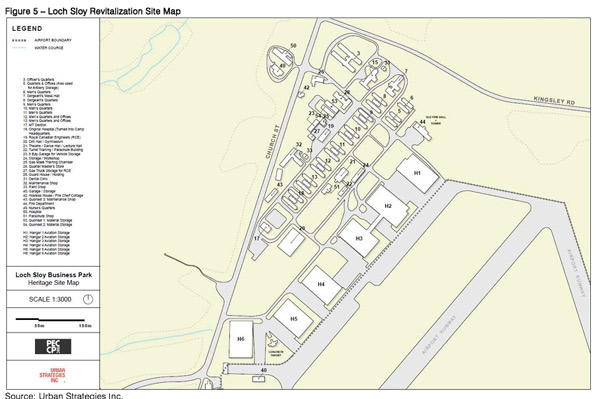Base31 gets further year extension to operate, as it waits for “permanent” status
Administrator | Apr 21, 2025 | Comments 0
By Sharon Harrison
Council unanimously approved a one-year extension (until May 18, 2026) to a temporary-use bylaw allowing existing operations at the Base31 site to continue.
The extension also extends the term of temporary water and wastewater allocation as work to service the lands with municipal water and wastewater are nearing completion.
The 13-0 recorded vote in favour (councillor Janice Maynard was absent) also approved a deferral of the water and wastewater connection charges for PEC Community Partners Inc. (operating as Base31) at last week’s planning and development committee meeting.
The deferral for the County Road 22 and Kingsley Road site will be in place until such time as water and wastewater allocation is deemed permanent, in accordance with the interim servicing agreement (ISA).
On May 24, 2022, council approved a temporary-use bylaw for Base31 for three years, which expires May 18, 2025. The planning act permits council to enact temporary-use bylaws for up to three years, and permits council to extend them for up to three years. Each extension is at council’s discretion, and there are no limits on the number of times council can extend.
Since approval of the temporary-use bylaw in 2022, PEC Community Partners Inc. has executed an ISA with the municipality and is nearing completion of work to install water and wastewater services. The ISA allocates temporary water and wastewater servicing to support the incremental increase in activity at Base31.
Under a new two-step process (effective Jan. 1), the statutory public meeting, the second in the two-step process, came with a report and recommendation by the development services department for council’s decision.
The intent of the temporary-use bylaw is to permit the revitalization and development of the site until a minister’s zoning order (MZO) is in effect for the site. The MZO has yet to be issued. The MZO, once in effect, will be the zoning for the site and would nullify the temporary-use bylaw.
The County’s consultant, Stephen Willis with Stantec Consulting Limited, in his report to council, noted the extension bylaw makes no changes to the permitted uses from the original bylaw other than extending the expiration date.
 Willis states PEC Community Partners Inc. has filed applications for plan of sub-division for Village A, and to break the existing revitalization area lands into separate parcels. They have also filed a site plan approval application for the first rental building which is to include attainable and affordable housing. The balance of the site is to be developed through plans of sub-division, or further site plan approvals.
Willis states PEC Community Partners Inc. has filed applications for plan of sub-division for Village A, and to break the existing revitalization area lands into separate parcels. They have also filed a site plan approval application for the first rental building which is to include attainable and affordable housing. The balance of the site is to be developed through plans of sub-division, or further site plan approvals.
Christopher Marchese and Assaf Weisz, with PEC Community Partners (Base31), provided a presentation highlighting key updates on what’s been happening at the base, where Marchese noted how, over the past year, they have invested approximately $15 million in critical infrastructure, replacing aging water and wastewater systems that once served the former Camp Picton base and Loch Sloy.
Base31 currently employs 40 full-time people year-round, and that is expected to be extended to a further 55 or so part-time employees as the season ramps-up. They also have about 50 tenants, many local small businesses.

The Base31 website states “the 750-acre site is envisioned as a dynamic collection of villages with a mix of uses: retail, restaurants, places to work and create, parks, trails, and recreation areas, a full complement of community amenities, and a range of housing.”
“This investment not only supports our long-standing tenants, but also lays the groundwork for new business opportunities,” said Marchese. “Most importantly, we remain committed to our promise delivering purpose-built rental building, including affordable units, and continuing design work on the first residential village. All these applications have been submitted, deemed complete and are currently under review by County staff.”
Speaking to why an extension of the temporary-use bylaw is required, Marchese explained the process thus far.
He said that over 18 months ago, council passed a motion requesting a municipally-initiated MZO from the province. However, due to the recent (provincial) election and ministerial changes, the request remains with the province for action.
“Every indication that we have heard is that the province is excited and is a supporter of this project, but this is the reason why we are here asking for an extension of the temporary bylaw,” said Marchese.
He said the extension of the bylaw is the extension of the status quo that has existed for the past three years and nothing is changing.
Councillor Corey Engelsdorfer said he was confused about the connection charges of $750,000 mentioned in the staff report that have not been collected from Base31.
“We are going down the path of a development charges (DC) bylaw, so when that time comes, will we be collecting connection charges or will it switch over to DCs, how will that work?” asked Engelsdorfer.
Marchese responded by saying, “They are charges that would be applicable at that time when the allocation is made permanent, they would be the applicable connection charges…DCs will be separate from connections charges as we understand it currently, but if that’s added in the future, whatever is applicable would be charged at that time,” Marchese confirmed.
Also recommended was that while consumption charges be applied, water and wastewater connection charges be deferred because water and wastewater allocation is temporary at this time.
Connection charges, along with all other applicable development-related fees and charges, would be payable in full when water and wastewater allocation is deemed permanent in accordance with the ISA. Permanent water and wastewater allocation requires the execution of an associated sub-division agreement.
A member of the public, Dorothy Bothwell spoke to the temporary-use bylaw extension request, the connection charges incurred to date, the MZO and more, where she also said council should consider extending the temporary-uses ISA bylaw for only six months.
“At which time, if the MZO has still not been approved, and that’s been going on three years, the temporary uses authority would expire and a zoning bylaw amendment would be required to be filed based on the new comprehensive zoning bylaw in effect.”
“Before you approve the recommendations in this report, you may want to ask staff, how many other for-profit developers have been given over three years carte blanche to operate over 45 different businesses or uses with no limit on the number of special events, of up to 5,000 people, tent and RV camping for all those folks, without proper zoning in place,” expressed Bothwell.
Michaud confirmed that there may be one other temporary-use bylaw in play at this point in the County, “but it’s not at this level”.
Bothwell also questioned how three years wasn’t enough time for the developer to file a zoning bylaw amendment to get approval for all the uses.
“With the County near to finalizing an updated comprehensive zoning bylaw, they will not be subject to it. Would holding a transparent public zoning bylaw amendment process pose a risk to the developer that they might lose the right to, and enjoyment of, some of these uses?”
Speaking to the estimated connection charges of $750,000 incurred to date noted in the report, Bothwell asked why the connection charges bylaw are not being taken at face value as it is written, and collecting them now.
“How can the County legally collect connection charges or development charges years after the fact?”.
She also addressed the proposed 120-unit, seven-storey rental apartment building within the revitalization district area (currently under site plan review) which is proposed to be on a private water and sewer system.
“How does this impact the potential connection charges or water/wastewater development charges which might be under a new DC bylaw, and the timeline for receiving them?” she asked.
“Being a rental building, will it be exempt from water/wastewater DCs? How will the ever-expanding tent and RV camping area be serviced with water and sewer? How long do we have to wait to collect DCs and connection charges for buildings and development already completed? When is it expected that the water/wastewater allocation will be deemed permanent, so we can get our money?”
The water and sanitary sewer connection charges bylaw requires that all connections to municipal water and wastewater sewer works pay connection fees no later than issuance of a building permit. “Estimated connection charges total over $750,000 and staff do not believe it was the intent of the bylaw to apply such charges to uses that are only granted on a temporary basis,” noted Willis.
“The ISA states that municipal servicing is temporary pending the execution of an associated sub-division agreement. To this end, it is the recommendation of staff that connection charges, along with all other applicable development related fees and charges, be payable at the time water and wastewater allocation is deemed permanent as per the terms of the ISA.
Works related to the ISA are nearing completion, including the connection of buildings to municipal water and wastewater which represent 95 per cent of the allocation the ISA provides to the Base31 site on a temporary basis, notes Willis’s report.
Filed Under: Local News
About the Author:




























